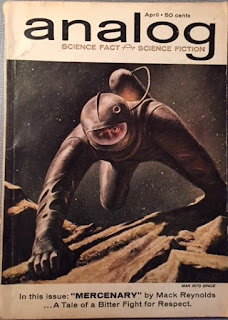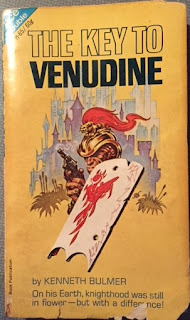a review by Rich Horton
Kenneth Bulmer again! And Mack Reynolds this time, the first time I've looked at one of his books.
Indeed Reynolds is something of a curious lacuna in my reading of SF. He was born in 1917, full name Dallas McCord Reynolds. He began publishing SF in 1950. He was a prolific short story writer through the decade, often using pseudonymns, including the fairly transparent Guy McCord and Dallas Ross. (A later pseudonym for romance novels was Maxine Reynolds.) He published a mystery novel (set an an SF convention, shades of Sharyn McCrumb!) in 1951, but did not publish another novel for a decade. He published a great many novels from then until his death in 1983. His father was twice the Socialist candidate for US president, and Mack was an ardent Socialist and longtime member of the American Socialist Party. After he became a regular contributor to the notably conservative John Campbell's Analog he had a reputation as sort of Campbell's token Commie, though Reynolds' socialism, though sincere, was cranky in just the sort of ways that, it seems to me, would appeal to Campbell. His novels were certainly available when I started buying books, but they didn't have tremendous reputations, and they never really appealed much to me. So I never read much of his work. It seemed like a good time to at least give one of his novels a try.
And as I've noted before: Henry Kenneth Bulmer, born in England in 1921, was a very prolific writer from the early '50s, under his own name and many others, most notably "Alan Burt Akers", the name under which he wrote the Dray Prescot series for DAW. He was primarily an SF writer, but also did a lot of work in other genres. He was editor of the New Writings in SF anthology series after the death of John Carnell. He died in 2005.
Both these novels are parts of series. Reynolds' Mercenary From Tomorrow (1962, 1968) is a Joe Mauser novel, the first in a series that eventually included three further novels: The Earth War (1963), Time Gladiator (1964, 1966, exp 1986 by Michael Banks as Sweet Dreams, Sweet Princes (title of the original serial), and The Fracas Factor (1976). As you can see, a complex publication history, the more so if we consider that a story featuring Joe Mauser was published in Fantastic Universe in 1957: "Happy Ending" (written with Fredric Brown), and that a related story (without Joe Mauser), "Status Quo", appeared in Analog in 1961. Mercenary From Tomorrow, as far as I can tell the most interesting of the stories, first appeared as a novella, "Mercenary", in the April 1962 Analog. That version was about 21,000 words long. The Ace Double is more than double that length, some 45,000 words.
(As ever, credit goes to the Science Fiction Encyclopedia entry on Mack Reynolds for lots of good information.)
 |
| (Cover by Jack Gaughan) |
Joe Mauser is a soldier for hire in a near future dominated by corporations, and by a social structure (called People's Capitalism) based on a post-scarcity economy, and stratified into social classes (Lower, Middle, and Upper, with their own subdivisions) and skill categories (Military, Food Preparation, Clothing, Religion, etc.). The Military category fights wars between the corporations, wars which are televised. Successful veterans can get enough money and prestige to jump classes -- Joe himself was born a Mid-Lower and is now a Middle-Middle. I didn't find much of this convincing, but I did find it somewhat interesting. The other interesting fillip is that wars must be fought with pre-1900 technology.
Joe is about to sign up with Baron Haer's Vacuum Tube Transport, who are about to fight a war (or "fracas") with Continental Hovercraft. The problem is, Vacuum Tube Transport is an upstart company, and the much bigger Continental Hovercraft has maneuvered them into a war which they are not financially able to fight. Joe know they are a lost cause, and that only inexperienced soldiers will sign up. Indeed, the commander of Continental's army is Stonewall Cogswell, a General with whom Joe has previously served, and whom he admires. (Note the Tuckerization -- besides Cogswell, I recognized a Sturgeon and a Sohl as minor characters.) But Joe has a plan -- a gimmick -- by which he hopes to engineer a spectacular upset, and in so doing gain himself advancement to the Upper Class.
Things are complicated a bit when he meets Baron Haer's two children -- Balt Haer, the rather spoiled heir, who will be a commander in the Vacuum Tube Army, and Nadine, a stunningly beautiful woman, a Doctor, who turns out to have some revolutionary ideas of her own. But Joe manages to suppress his attraction to Nadine, and to finesse his distaste for Balt Haer, and to convince the Baron to allow him to try out his (still secret) gimmick.
The rest of the novel includes some filling in of social details, via conversations with Joe's new, young, Lower, batman, Max Mainz; and with a veteran newsman. There is also a day on the town, where Joe is seduced (almost) by a beautiful "fracas groupie". And an encounter with a representative of the Soviet bloc -- they observe American fracases to make sure post-1900 technology is not being used. This representative is clearly up to no good ... And there is an assassination plot against Joe, and a flashback to one of his previous battles.
All leads to Joe's mysterious gimmick -- which is sensible enough but not quite as dramatic as I had hoped. The actual "fracas" is a bit of an anticlimax, though that's OK in the context of the story Reynolds wants to tell. And the conclusion features a somewhat bitter, but not unrelievedly so, twist.
 |
| (Cover by John Schoenherr) |
I enjoyed the novel, perhaps more than I expected. I'm tempted to seek out the rest of the Joe Mauser stories, though the SFE suggests that they are less interesting. I did find a copy of the April 1962 Analog, to compare "Mercenary" with the expanded novel version. The main thread of the story is identical (with the exception of a few small editorial changes), but the novella doesn't have the "fracas groupie, nor the assassination plot, nor the battle flashback, and also one pre-fracas aerial reconnaissance scene is new in the book. I'd say the novella has everything essential -- the additional scenes in the novel are enjoyable enough to read but really add very little.
Bulmer's novel, The Key to Venudine, is also part of a series. It's the third book of eight called collectively Keys to the Dimensions. I've read one other entry in that series -- the fourth book, The Wizard of Senchuria. The conceit is that there are sort of parallel Earths, with widely varying levels of technology, and even aliens on some of them, and certain people can sense Portals to the other worlds. As far as I can tell from two I've read, each of the books (with the possible exception of the last, The Diamond Contessa (1983)) is mostly independent, with some mostly minor references to the overarching conflict of the series, between the evil Contessa di Montevarchi and another group of good guys.
 |
| (Cover by Kelly Freas) |
Before long Fezius, having fallen head over heels in love with Princess Lai, is trying to help them escape from the thuggish Rodro. And Fezius is forced to believe in Lai's "powers", which consist really in her ability to sense the Portals to other dimensions, and in some tech she has got from those worlds. Fezius' dangerous exploits lead him to contact with the scary aliens called Slikitters, and later on lead him to Earth, where he learns of the conflict between Nofret and Lai's allies on Earth, and the evil Contessa.
There's a lot of action, nicely portrayed, and a lot of jumping between dimensions, finally leading to a final confrontation with Rodro and the Contessa. It's generally pretty enjoyable if pretty minor work, but better than some of the other Bulmer novels I've read. I was a little disappointed in the ending, specifically the resolution of the Fezius-Lai romance, in which it is anticlimactically revealed that Lai had another boyfriend on another world all along. Luckily for Fezius he's taken a shine to an Earth woman he met during his adventures ...
In sum -- this is kind of a good example of the middle range of Ace Doubles. Both novels have good points -- they're fun enough. Neither is a lasting masterwork. Mercenary From Tomorrow is a bit more serious, and the more lasting of the two.
I remember reading the Mack story in Analog at the time, but wasn't more than mildly entertained. Thanks for the review, Rich.
ReplyDeleteMildly entertained seems reasonable enough!
Delete